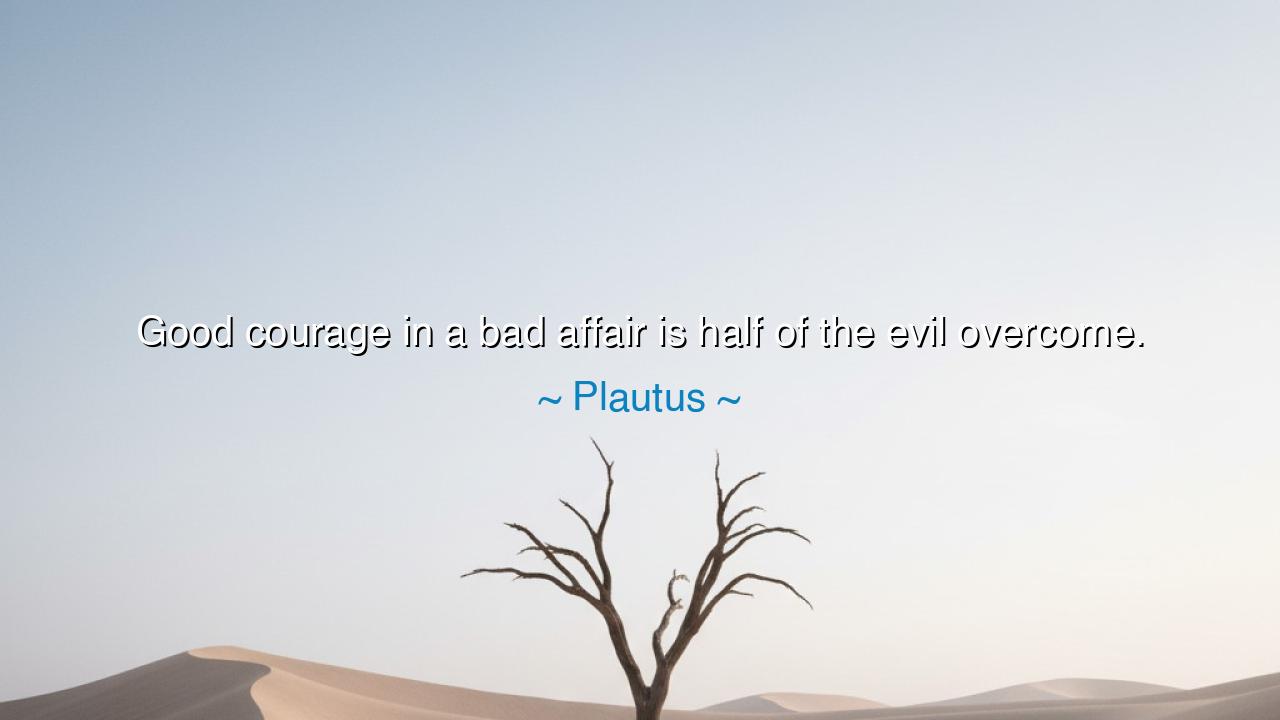
Good courage in a bad affair is half of the evil overcome.






“Good courage in a bad affair is half of the evil overcome.” Thus spoke Plautus, the Roman playwright whose wit and wisdom were often hidden within the laughter of his comedies. But here, beneath the cloak of humor, shines a truth forged from the fire of experience—a truth as old as struggle itself. He teaches that when calamity strikes, when the gods seem to frown and fortune deserts us, courage is not merely a virtue; it is the weapon that turns defeat into endurance. For though we cannot always choose our battles, we can always choose the spirit with which we fight them.
Plautus lived in an age when Rome itself was still learning the meaning of perseverance. His plays, though full of laughter, spoke often to the human heart under pressure—the debtor pursued by ruin, the soldier far from home, the slave yearning for freedom. His line, “Good courage in a bad affair is half of the evil overcome,” rises from this soil of hardship. It declares that despair is the ally of misfortune, while courage is its enemy. When a man’s will remains unbroken, the power of adversity is already halved, for misfortune thrives only where the spirit has surrendered.
The ancients revered this idea. To them, courage was not the absence of fear, but the mastery of it. Aristotle called courage the golden mean between cowardice and recklessness—the steady flame that burns when all else falters. In the face of a “bad affair,” be it war, illness, betrayal, or loss, the courageous soul preserves its center, refusing to be ruled by despair. Such courage, Plautus reminds us, is not blind optimism; it is the refusal to yield to darkness even when light is scarce. It is the quiet, iron conviction that struggle itself has meaning—that to endure is to conquer.
Consider the story of Ernest Shackleton, the explorer who led his men through the icy wastelands of Antarctica. When his ship, Endurance, was crushed by the frozen sea, he faced ruin: starvation, isolation, and death itself. Yet Shackleton never yielded. Each morning, he spoke to his crew with calm and cheer, saying, “We must go on. We shall prevail.” His good courage, held firm through months of suffering, became a lamp for his men. Against all odds, he brought every one of them home alive. Shackleton’s triumph was not over the ice, but over fear. He had already overcome “half the evil” by refusing to let despair claim him.
So it is in every human struggle. Misfortune may strike like a tempest, tearing down our plans and hopes, but it cannot touch the fortress of the steadfast spirit. The one who meets hardship with courage stands already on higher ground. For every evil carries two weights: the weight of circumstance, and the weight of hopelessness. The first may be borne with effort, but the second is self-imposed. When we cast it off—when we say, “I will not despair”—we have already lifted half the burden. Thus, Plautus calls courage the first victory of the soul.
The lesson, then, is clear: do not wait for good fortune to find your strength—find your strength first, and fortune may yet follow. When adversity comes, let not your heart be clouded by complaint or fear. Stand upright within yourself. Speak calmly. Take one step, however small, toward the light. For the world cannot break a spirit that refuses to bend. The bad affair may rage around you, but your good courage is the anchor that holds fast in the storm.
To live by this wisdom, practice courage in small trials, that you may possess it in great ones. When life tests you, do not ask, “Why me?” but “How shall I rise?” Remember that every evil seeks to diminish you first in spirit. Defy it there. Keep faith in your own endurance, and let your heart be greater than your hardship. For as Plautus declared, courage cuts the power of misfortune in half—and the one who stands unafraid before evil has already won the better part of victory.
So, my listener, carry these words as a shield in dark times: “Good courage in a bad affair is half of the evil overcome.” Let your courage be not loud, but steady; not born of pride, but of purpose. In the face of every trial, hold fast, and know this truth—the brave soul may not always change his fate, but he always transforms it. For where courage stands, evil cannot reign, and even in defeat, the spirit remains unconquered.






AAdministratorAdministrator
Welcome, honored guests. Please leave a comment, we will respond soon